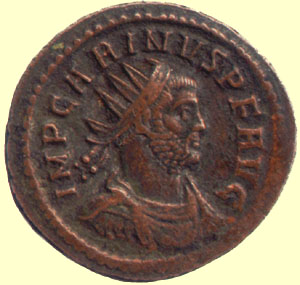 Contents -
Previous Article -
Next Article
Contents -
Previous Article -
Next Article
Carinus was living in Rome at the time of his father Carus' death. He immediately became Emperor in the West, while his brother Numerianus was raised to the rank of emperor by the soldiers on campaign in Persia. Carinus was a dissolute individual like Commodus and Elagabalus, and had all the cruelty of Domitian, Commodus, Caracalla, and Maximinus the Thracian. After he became Emperor and all constraints on his behavior were loosed, he took to a life of pleasure and debauchery. He married and quickly divorced nine wives, leaving most of them pregnant. He persecuted those who had opposed or made fun of him before he became emperor and executed or banished those of his ministers who dared to criticize him now. He was fairly well liked by the common people, though, because he put on splendid games and circuses for their entertainment. Many older people remembered the Saecular Games of Philip the Arab, and Gallienus' and Aurelian's triumphs, but thought the games of Carinus were better. He had no more respect for the Senate and expressed his intention of dividing the vast estates of the senators among the people.
The course of events in the East, with the murder of his brother Numerian and the elevation of Diocletian, were the beginning of the end for Carinus. Diocletian led his armies towards Rome with the design of taking the throne from Carinus. The two armies met near Margus, a small city in Moesia (Modern Macedonia and Albania). Carinus was losing popularity amongst the troops even as Diocletian was becoming more popular. It was Carinus' lust and vices that were his undoing. He seduced the wife of one of his faithful tribunes. When the man heard what his emperor had done, he became enraged and killed his philanderer sovereign. Diocletian thus became master of the entire Roman Empire and was to introduce far-reaching reforms that were to change the entire fabric of Roman society and radically change the way the government was run. In the process, the emperor was to become not merely PRINCEPS, or "First Citizen", but DOMINVS, meaning "Lord and master."
Go to next article on Emperor Numerianus
Go back to previous article on Emperor Probus